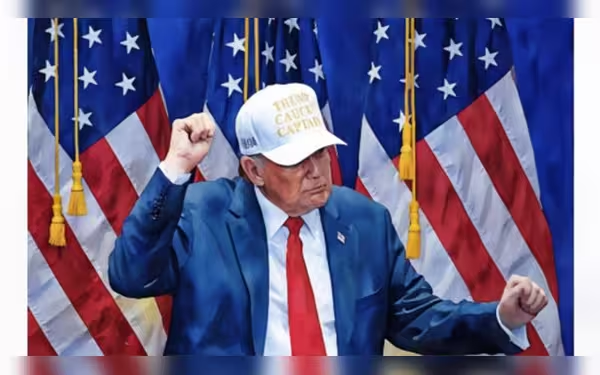Saturday, November 23, 2024 07:07 PM
Trump's Presidency: A Shift in Global Political Dynamics
- Trump's policies reshape Europe and NATO dynamics.
- Middle East tensions escalate under Trump's leadership.
- Technology sector faces challenges amid US-China rivalry.
 Image Credits: thefridaytimes
Image Credits: thefridaytimesTrump's presidency signals a major shift in global politics, impacting Europe, NATO, and the Middle East.
The election of Donald Trump as President of the United States marks a significant shift in the global political landscape. His presidency is expected to bring about changes that will affect not only the United States but also Europe, the Middle East, and Asia. As countries around the world adjust to this new reality, the implications of Trump's policies will be felt far and wide.
In Europe, the aftermath of Trump's victory has already led to political upheaval. The German government was quickly dissolved, prompting urgent discussions among European leaders. Germany and France's defense ministers met to address the growing concerns about security and military readiness. Italy, facing financial difficulties, expressed the need for a professional army and sought assistance from the European Union. This situation has created a sense of urgency among European policymakers, who are now questioning how to respond to Trump's America-first approach.
As the political landscape shifts, there are predictions that Marine Le Pen may win the French presidential election, while the Christian Democratic Union (CDU) in Germany is expected to perform well in upcoming elections. The rise of the Alternative for Germany (AfD) party indicates a potential power struggle within Germany, particularly between the states of Berlin and Bavaria. The social welfare system in Germany is showing signs of strain, and elections are anticipated in March, which could further alter the political dynamics.
Turning to the east, Turkey's role within NATO is crucial. The United States aims to counter China's Belt and Road initiative, and Turkey's involvement in this project is significant. Trump may propose a deal to Turkey, offering military support in exchange for its neutrality regarding China and Russia. However, it remains uncertain whether Turkey will accept such terms, and trade disputes are likely to arise in the near future.
In the Middle East and North Africa (MENA) region, the ongoing conflict involving Israel, Gaza, and Lebanon has drawn in Iran and its allies. Trump is expected to adopt a more constructive approach towards Gulf countries and Syria, engaging in direct talks with each member of the Gulf Cooperation Council (GCC). While it is unclear if he will take military action against Iran, his administration is likely to continue supporting Israel and seek resolutions to conflicts in Ukraine and Lebanon.
Trump's presidency may also intensify tensions in the technology sector, particularly between the United States and China. He is likely to urge Europe to align with the U.S. against China, which could worsen the economic challenges Europe is currently facing. Historically, Europe and China have maintained stable trade relations, but Trump's leadership may force Europe to choose sides.
Moreover, Trump has expressed intentions to resolve the conflict in Ukraine, suggesting that Ukraine may have to make territorial concessions to Russia. His previous claims of ending the war in just "two days" reflect a bold approach that could lead to significant changes in international relations.
The implications of Trump's presidency are vast and complex. As nations navigate this new geopolitical landscape, the choices made by leaders will shape the future of international relations. The world is watching closely, and the decisions taken in the coming months will have lasting effects on global stability and cooperation. Understanding these dynamics is crucial for anyone interested in the future of global politics.













